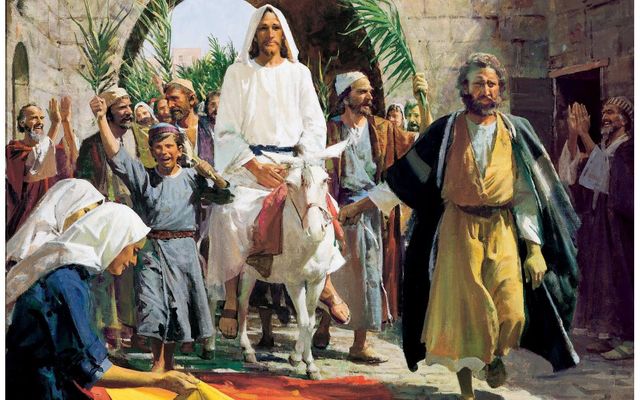
37 Then, as He was now drawing near the descent of the Mount of Olives, the whole multitude of the disciples began to rejoice and praise God with a loud voice for all the mighty works they had seen, 38 saying: “Blessed is the King who comes in the name of the Lord!’ Peace in heaven and glory in the highest!” (Luke 19:37-38)
The scene is set in Luke 19:37-38, as Jesus approaches Jerusalem, not with the thundering hooves of war horses, but with the gentle tread of a donkey's feet. This momentous occasion, now celebrated as Palm Sunday, begins our reflection, “Why did Jesus ride a donkey?”
First, Jesus rode a donkey into Jerusalem to fulfil a prophecy in the Old Testament book of Zechariah. "Daughter Zion, rejoice! Daughter Jerusalem, shout! Your king comes to you, righteous and victorious, humble and riding on a donkey, on a colt, the foal of a donkey." (Zechariah 9:9)
The donkey, an animal of peace, contrasts sharply with the horse, a steed of war. Jesus' choice is deliberate; He presents Himself as a different kind of King, one who brings salvation not by the sword but by sacrifice. John 12:15 reiterates this image of humility, reinforcing the message that Jesus’ kingdom is not of this world.
In a world acquainted with the pomp of power, Jesus subverts expectations. He chooses a mount that speaks to His mission: to bring peace between God and humanity. Isaiah 9:6 foretold of a coming Prince of Peace, and here Jesus fulfils this title, entering the city not to dominate but to deliver.
The crowd’s actions — spreading cloaks and palm branches — were signs of honour, acknowledging Jesus as the awaited Messiah. Matthew 21:8-9 captures the fervent hope of the people, their voices lifting in a chorus of hosannas, recognising in Jesus the dawn of deliverance.
Lord Jesus' acceptance of the title "King of the Jews" is significant. Riding on a colt, He accepts the mantle of leadership, but it is a kingship defined by service and surrender. Mark 10:45 affirms this, stating, "For even the Son of Man came not to be served but to serve, and to give His life as a ransom for many."
The detail that the colt had never been ridden is not just a footnote; it signifies something sacred. In ancient times, an animal that had not been put to common use was deemed fit for a holy purpose. By choosing such a colt, Jesus was consecrating His path to the cross as holy, set apart for God’s redemptive work.
In Jesus’ procession, we find a vivid contrast to the world’s definitions of authority and power. His kingdom is not advanced by force or fear, but by love and humility. Matthew 5:5 blesses the meek, for they shall inherit the earth, a beatitude personified by Jesus Himself.
As followers of Christ, we are called to emulate the humility of our King. To lay down our lives as He laid down His, to carry our cross as He carried His. Galatians 5:22-23 speaks of the fruit of the Spirit, among which is gentleness, a quality exemplified by Christ’s entry into Jerusalem.
Lord Jesus' ride on a donkey stands as an enduring symbol of the majesty found in meekness. It invites us to reconsider our quest for power and to embrace a life marked by the gentle strength of our Savior.
Prayer
Lord Jesus, our Humble King, teach us to walk in your footsteps of peace. May we honour You not with fanfare but with faithfulness, spreading the branches of our lives before You in a procession of praise. In Jesus’ name. Amen.
Join our WhatsApp Channel


Most Read
● 21 Days Fast: Day #21● Closing Spiritual Doors
● 21 Days Fast: Day #10
● Walking by Faith
● Are You Spiritually Fit?
● Quality Family Time
● Accessing the Supernatural
Comments
 142
142
 98
98
 4116
4116







